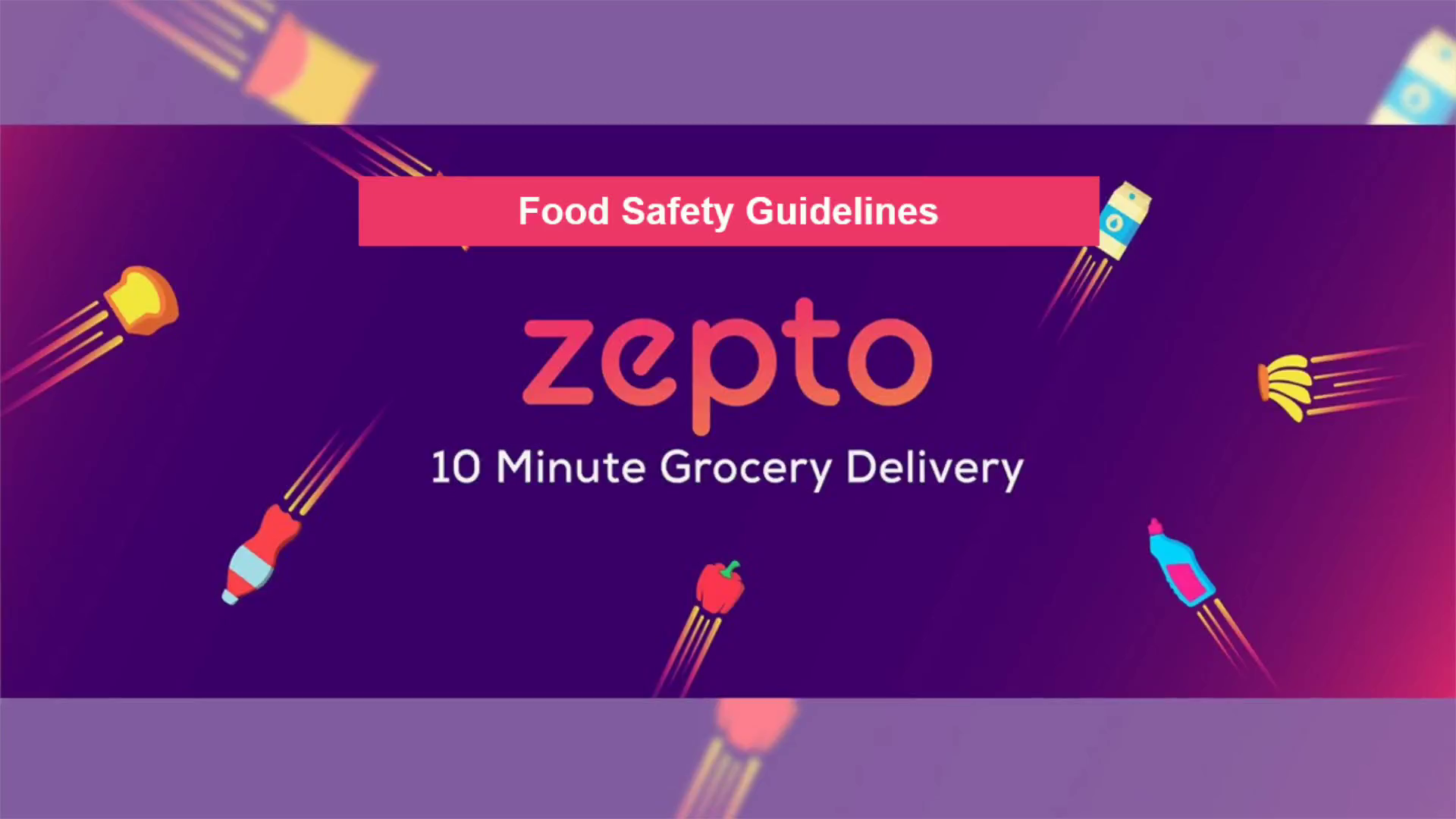
NEW Food Safety Guidelines
Scene 1 (0s)
[Audio] In this module, we will learn about Food safety guidelines. We will also learn about FSSAI and how it impacts the DH. .
Scene 2 (12s)
[Audio] Why do we need to understand food safety? Customers order food online for their ease and convenience. They expect best quality products from Zepto as a grocery delivery company. Food safety is very important as it affects the health of our consumers. .
Scene 3 (32s)
[Audio] So, it is our responsibility as associates to store and pack food in the best condition for our Zepto customers. .
Scene 4 (43s)
[Audio] Now let's see which inventory items can be called 'Food'? Any substance used to produce energy in living organisms is known as food. It can be items which are used for eating or drinking. .
Scene 5 (59s)
[Audio] Indian government created an authority to ensure that food is acceptable for eating and drinking purposes, in 2008. This authority is called 'Food Safety and Standards Authority of India'. .
Scene 6 (1m 16s)
[Audio] FSSAI sets scientific standards for food storage and distribution for safety and health of consumers. FSSAI also has certain guidelines for food storage. Let us learn about them. .
Scene 7 (1m 33s)
[Audio] Guidelines for food and non-food storage. 1. Do Not Store Food and Non-food Together. Food items are made for human consumption. That is-Eating and drinking. How to identify food and non-food items? The item with the FSSAI logo is a food item and items without the FSSAI logo are non-food categories. We must not store food and non-food items together to avoid food spoilage due to mixing categories. .
Scene 8 (2m 7s)
[Audio] 2. Temperature control: Food products should be stored at the recommended temperature, as per the guidelines specified by the FSSAI. Put away food products in specific storage areas like – Dry storage zone, ambient, chiller and freezer rooms. The temperature should be monitored regularly to ensure that it remains within the safe range. .
Scene 9 (2m 35s)
[Audio] 3. Checking Veg and Non-veg Marking on Food. Food products are always marked with the green logo for Vegetarian food and Red logo for non-vegetarian food. Make sure that you check the details and put away or pick items accordingly. .
Scene 10 (2m 54s)
[Audio] 4. Storing Pet Food. At the DH, a separate section should be kept for storing food for animals to avoid cross-contamination. Pet foods are more likely to attract rats so place rodent stations nearby. If the pack is torn, it can be attacked by insects and cause bad smell at DH. .
Scene 11 (3m 19s)
[Audio] Auditing, in this case, means a systematic checking of the DH's processes and inventory by auditors. There are many criteria which are checked. Documentation: Delivery Hubs should maintain proper records and documentation of all food products received, stored, and dispatched. This helps in tracking in case of any issues. Food businesses to must follow these guidelines to ensure that the food products are safe for consumption and meet the quality standards set by the FSSAI. .
Scene 12 (3m 56s)
[Audio] While doing Put away and picking, take care of title check and proper labelling. All food products should be properly labelled with information such as batch number, expiry date, and manufacturing date. Inventory auditing includes D.E.Q . Or Damage, Expiry and Quality checks of the inventory items. Regular auditing ensures that the DH is following proper processes and inventory is in good condition. Associates should follow- 6 side damage check before packing. They must follow FIFO or First in first out and FEFO that is -First expiry first out method for timely expiry removal. .
Scene 13 (4m 42s)
[Audio] 6. DH Cleanliness . It is the responsibility of all staff to keep the DH clean. Do not spit on the walls. Ensure regular dusting so that only clean products reach customers. All equipment, surfaces, and storage areas at the DH should be regularly cleaned and sanitized. Make sure that the fly catcher is turned on and rodent station is working. If any mouse or rat is seen at the DH immediately report to the DHM. Unclean storage spaces create contamination and pest problems. .
Scene 14 (5m 24s)
[Audio] To sum it up, following food safety has a lot of benefits. Keeping the food in hygienic condition keeps food-borne diseases away. It also helps in Maintaining the quality and freshness of food making it more enjoyable and healthy to eat. .
Scene 15 (5m 43s)
[Audio] Maintaining food hygiene ensures Proper Compliance of FSSAI guidelines. Following food safety practices is often required by law, and non-compliance can result in fines or legal action. Storing food properly also helps in reducing food wastage by preventing spoilage and extending the shelf life of food. .
Scene 16 (6m 8s)
[Audio] Congratulations, you have completed this module! .